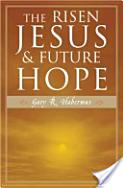In the previous post dated March 5, 2009, it was asserted that philosophy possesses an interesting conundrum for the believer, since it is both unavoidable and dangerous. The goal of the current posting is three-fold: 1) to familiarize the reader with the four basic laws of rational thought, 2) to demonstrate that Mid-Acts Dispensationalists use these laws when presenting their doctrinal positions, and 3) to attempt to prove that the Mid-Acts position is the only logically tenable conclusion. The methodology of dispensational Bible study is intimately entwined with the laws of logic. Proponents of right division have often argued that it is simply by observing the distinctions that God has placed within His word that one can understand God in God's way. Statements like these are meaningless unless there is a way to ascertain differences in the way God has dealt with humanity throughout time.
If one defines theology as "a rational discourse about God," then all theology, dispensational or otherwise is built upon the elementary laws of logic.(1) "If logic is a necessary precondition of all thought, then it must also be necessary for all thought about God."(2) Logic is supported by four undeniable principles. These laws are self-evident as well as self-explanatory, there is no way around them. In order to deny them, one must assume the very principles one seeks to disprove. In other words, any attempt to falsify these laws would require that one assert the very principle one is attempting to deny.
In philosophy these are known as first principles and are considered the foundation of all knowledge. Without them nothing could be known.(3) These include the following:
- The Principle of Existence--Being Is (B is)--The fact that I exist is undeniable for I would have to exist in order to deny my existence.(4)
- The Principle of Identity--Being is Being (B is B)--A thing must be identical to itself. If it were not then it would not be itself. Theologically, if this law of were not binding, one could not say that God is God (G is G).(5)
- The Principle of Noncontradiction--Being Is Not Nonbeing (B is Not Non-B)--Being cannot be nonbeing, for they are direct opposites, and opposites cannot be the same.(6) Without this law, one could not say that God is not non-God (G is not non-G). "Thus, God could be the devil or whatever is anti-God."(7)
- The Principle of Excluded Middle--Either Being or Nonbeing (Either B or Non-B)--"Since being and nonbeing are opposites, and opposites cannot be the same, nothing can hide in the cracks between being and nonbeing. The only choices are being and nonbeing."(8) Theologically speaking, if the law of excluded middle did not exist there would have no way to discern whether it was God or not God we were speaking about. It is clearly absurd if when we were using the term God it could refer to both God and not God.(9)
These four laws, along with the laws of valid inference, whereby a conclusion can be properly drawn from given premises, form the basis for all theological discourse. As stated earlier, these principles are self-evident because any attempt to deny them requires one to assert that which one is attempting to disprove. Consider the following examples: "I think that I cannot think," "I know that I cannot know," or "I reason that I cannot reason." In each of these examples one is doing precisely what he or she claims is impossible. Similarly, without the law of noncontradiction, one would have no way to distinguish between statements that were true and false.
Pauline Dispensationalists utilize these laws routinely when presenting their unique doctrinal positions. Proponents of the Mid-Acts position often stress the following theological distinctions as elemental. The laws of Noncontradiction and Excluded Middle are unavoidable when distinguishing between: prophecy and mystery, earthly and heavenly programs, Israel and the Body of Christ, or law and grace. Simply stated, when you have two things that are different, they both cannot be the same. Consider the following example:
- Acts 3:21--Whom the heaven must receive until the times of restitution of all things, which God hath spoken by the mouth of all his holy prophets since the world began.
- Romans 16:25--Now to him that is of power to stablish you according to my gospel, and the preaching of Jesus Christ, according to the revelation of the mystery, which was kept secret since the world began,
The principles of Noncontradiction and Excluded Middle, necessitate that one acknowledge there is a difference between that which was spoken since the world began and that which was kept secret since he world began. Likewise, it would be totally illogical for someone to assert that the divergent instructions regarding circumcision found in Genesis 17:9-14 and Galatians 5:6 were in fact the same. While Genesis 17 was binding upon the people to whom it was given, it is impossible for both sets of instructions to be binding today because they teach opposites. Circumcision cannot be both required and not required as an ordinance upon the same people at the same time. Many more examples could be cited to prove the overall point that rightly dividing the word of truth is impossible without utilizing the four basic laws of logic.
Consequently, one is forced to conclude that Mid-Acts Dispensationalists utilize logic and philosophical argumentation when formulating and articulating their theological positions. It is the point of view of this author that instead of running from this conclusion, as some have done in the past, efforts should be made to present the Mid-Acts position for what it is, the only theological position that is not contrary to reason. Think about it for a moment. Virtually every other system of Biblical interpretation glosses over or flat-out denies that there are contradictions in the Bible that need to be recognized. The result is a theology which makes the untenable assertion that passages which plainly contradict each other are in fact the same.
Acts 2 or Acts 28 dispensationalists may attempt to cry foul on this conclusion, but there are details of those positions that defy logic. For the Acts 2 position to be correct, prophecy would have to become a mystery. Moreover, how can the last days of prophecy be the beginning of the Body of Christ? Similar problems exist for supporters of the Acts 28 position. Paul writes to the Corinthians about the Body of Christ prior to penning the Prison Epistles in Acts 28. If the Body of Christ did not begin until Acts 28, one is left with the bizarre conclusion that there were members in the Body of Christ before it began.
If sound reasoning is important to your belief system, look no further than the Pauline position. Mid-Acts Dispensationalism is the only theological viewpoint that consistently applies the fundamental laws of logic. It is time for the supporters of the Mid-Acts position to acknowledge and stand for the rational roots of our viewpoint.
Footnotes
1)Norman L. Geisler, Come Let Us Reason: An Introduction to Logical Thinking, (Grand Rapids: Baker Book House, 1990), 15-16.
2) Ibid., 16.
3) Norman L. Geisler. Baker Encyclopedia of Christian Apologetics. (Grand Rapids: Baker Book House, 1999), 250.4) Ibid., 250.
5) Norman L. Geisler. Systematic Theology: Volume One. (Minneapolis: Bethany House, 2002), 82.
6) Geisler, Baker Encyclopedia of Christian Apologetics, 250.
7) Geisler, Systematic Theology: Volume One, 81.
8) Geisler, Baker Encyclopedia of Christan Apologetics, 251.
9) Geisler, Systematic Theology: Volume One, 82.


























No comments:
Post a Comment